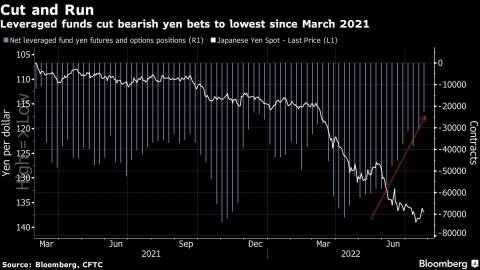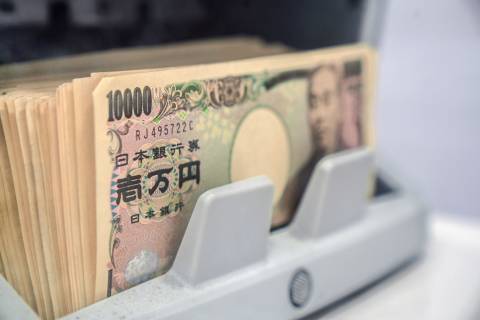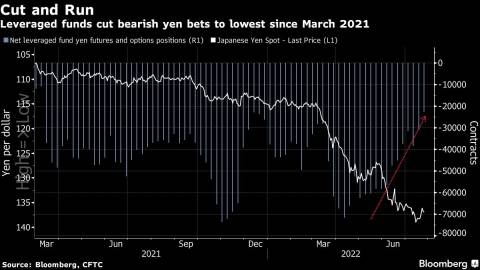(Bloomberg) -- The yen’s summer revival entered a fourth day as one of the biggest macro trades of the year continues to unwind.

The Japanese currency climbed as much as 0.9% to just above 132 per dollar in a fourth day of gains Monday. Hedge funds are selling down dollar positions and increasingly buying the yen as a haven play, according to Asia-based currency traders who asked not to be named as they are not authorized to discuss client activity publicly.

Lowered expectations for Federal Reserve rate hikes have led to a rally in Treasuries, narrowing the yield gap that had opened up between the US and Japan that helped drive the yen to a 24-year low. That has weakened the argument behind one of the most prominent trades of the year -- short the Japanese currency -- and resulted in a more than 5% rebound from the yen’s mid-July low.

Leveraged funds have slashed net-short futures and options positions on the Japanese currency to the lowest since March 2021, according to the latest data from the Commodity Futures Trading Commission. Net bearish bets of around 23,000 contracts are now less than a third of their April peak.

“Clients have been heavy buyers of yen of late and continue to hold a positive yen stance,” wrote Pepperstone Group head of research Chris Weston in a note Monday.
A narrowing inflation-adjusted yield differential between the US and Japan is driving the move, with positioning playing a role as well, according to Mayank Mishra, a global currency and macro strategist at Standard Chartered Bank in Singapore. The spread between 10-year real Treasury yields and their Japanese equivalents has shrunk to 0.80% from over 1.5% in mid June.
Mishra has been short the dollar-yen since it hit the 138.80 level and sees it heading toward 130, he said.
“We believe a cyclical peak in dollar-yen and yield differentials may be already in place,” he said. “Even if persistent inflation keeps the Fed hawkish for longer, rising growth concerns would keep long-end Treasury yields under pressure.”
Still, the currency remains the worst among Group-of-10 peers, down around 13% this year as the Bank of Japan keeps interest rates pinned to the floor even as the Fed hikes aggressively. Higher oil prices in energy-import heavy Japan and a blowout in the country’s trade deficit continue to weigh.
While the yen’s decline may be nearing its end, until markets get clarity on the view of the Fed, “there will be some turbulence,” said Maki Ogawa, head of financial market research at Sony Financial Group. “It’s still too early to say that the 140 yen exchange rate will no longer happen.”
(Updates with yield differential and Standard Chartered comment from sixth paragraph.)
More stories like this are available on bloomberg.com
©2022 Bloomberg L.P.
Author: Matthew Burgess and Hiroko Komiya
